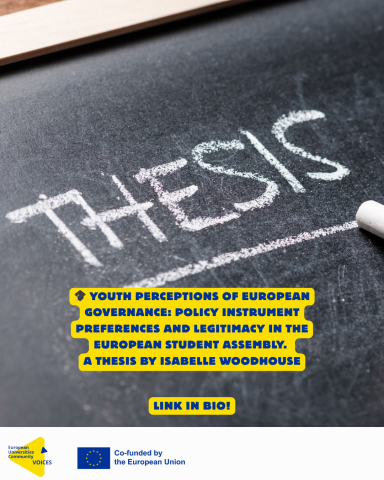
Alongside her work with the EUC Voices project, Isabelle Woodhouse, our project management intern, developed her own thesis research drawing on the experience of the European Student Assembly (ESA 2025). By analyzing the policy proposals written by students between 2022 and 2025, her study explores how the next generation connects policy choices to broader questions of legitimacy and trust in European governance.
The study explores policy proposals written by students at the ESA from 2022-2025, revealing how the next generation connects policy choices to questions of legitimacy and trust in European governance. Drawing on over 300 recommendations divided across six policy domains, it adopts a sequential mixed methods design that first maps policy instrument choices and then explores deeper the linguistic construction of the role the EU is perceived to have as an actor. Policy instruments are conceptualised not only as technical tools, but as symbolic devices that encode signals of what kind of authority the EU should have. For example, when it comes to policies relating to climate and democracy, students call for strong laws and financial commitments, expecting the EU to act as a bold regulator and moral leader. In education and health, they lean on softer tools including awareness campaigns, standards and partnerships, framing the EU as a facilitator of cultural change and capacity building. Digital governance is framed through the most hybrid mix, highlighting the complexity of balancing regulation, innovation and accountability.
Overall, the patterns reveal that EU legitimacy is conceptualised as being multi-modal. By foregrounding bottom-up perceptions of policy design the study extends sociological theories of instrumentation and contributes to debates on EU authority, presenting participatory forums like ESA as a space where governance is discursively imagined, contested and redefined.
How do young Europeans imagine the EU’s role and legitimacy? My study of 300+ ESA policy recommendations shows that students see the EU as
- A strong regulator and moral leader on climate and democracy
- A facilitator of cultural change in health and education
- A dynamic actor balancing innovation and rights in digital policy

